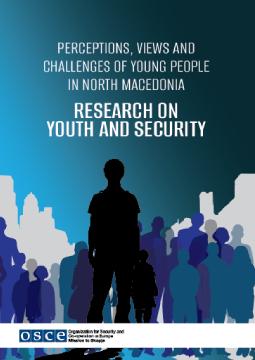Perceptions, views and challenges of young people in North Macedonia - Research on Youth and Security

This Research on Youth and Security provides an overview on young people's perceptions, views, and attitudes towards security and safety in North Macedonia, their participation in formal and informal peace processes, the peace and security agenda, and issues countering and preventing violent extremism in North Macedonia. The Research covered youth violence, cyberbullying, exclusion and marginalization at all levels, lack of trust towards the authorities and inter-community relations in the last decade.
The Research has the following aims:
- 1. Assess the perceptions, views, and challenges of young people with regard to security and safety in the Republic of North Macedonia;
- 2. Explore the security concerns and challenges faced by youth in the current socio-political context;
- 3. Examine the ways in which youth are impacted by security policies and how the practices of meaningful participation of youth in security policies and programming can be increased;
- 4. Investigate the sources of violence among young people, the potential contributions of youth to security, safety and resilience building in their communities;
- 5. Examine of factors that influence interethnic relations and cohesion among young people in the country;
- 6. Collect information that supports the strategic planning of the Mission.
The target group of this research were young people from 15 to 29 years from the Republic of North Macedonia. The sample included in total of 1235 respondents through the telephone survey. In addition, the research team conducted five (5) semi-structured interviews with stakeholders and eight (8) focus group discussions in the eight statistical regions in the cities of Skopje, Bitola, Tetovo, Sveti Nikole, Strumica and Struga with a total of 63 participants. The survey was conducted in the period of 27 September to 10 October 2023 while focus group discussions from 4 to 26 October 2023.
The Research is available in English, Macedonian and Albanian languages.
The views, opinions, conclusions and other information expressed in this document are not given nor necessarily endorsed by the Organization for Security and Co-operation in Europe (OSCE) unless the OSCE is explicitly defined as the Author of this document.
